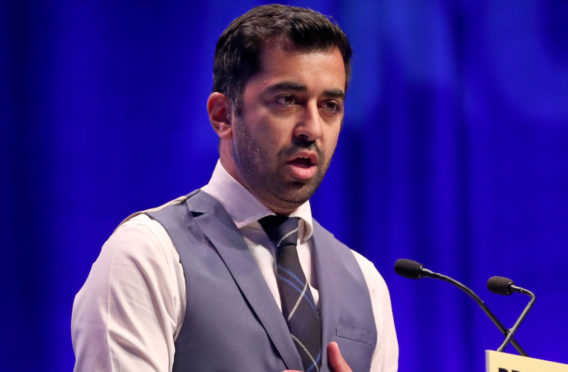
Domestic abuse charities voiced concern yesterday at plans to release prisoners from Scotland’s jails early to slow the spread of coronavirus behind bars.
They fear women could be put in danger if men with a history of violence towards their partners are suddenly freed without warning.
Justice Minister Humza Yousaf is considering releasing some inmates early in the face of an “increasingly alarming” situation in Scotland’s jails, with rising staff absences and growing numbers of prisoners having to self isolate. Around 120 inmates are now self- isolating, while two have tested positive for coronavirus.
Mr Yousaf said “emergency measures” are now being considered to limit the virus’s spread. Prisoners nearing the end of their sentence or those sentenced to less than three months are likely to be considered for early release within days. Speaking on Friday, Mr Yousaf said: “I am not committing to that but, certainly, the situation is increasingly alarming, for me increasingly concerning. I would be surprised if in one way, shape or form we did not look to release prisoners and do that relatively urgently.”
Retiring chief executive of the Scottish Prison Service Colin McConnell takes up a new role as a Scottish Government advisor tomorrow and is thought to be involved in managing the early release programme.
However, charities Scottish Women’s Aid and Zero Tolerance fear convicted domestic abusers could be among the prisoners offered early release.
Marsha Scott, chief executive of Scottish Women’s Aid, said Mr Yousaf had contacted her last week to seek her views.
She said she warned him domestic abusers should be “very low on the list” of prisoners to be released early, adding: “There is a lot of danger for women. We have concerns.
Ms Scott said there needed to be robust services for notifying victims when an offender is released; offenders should be rehoused away from their victims; and inmates who are released early should be fitted with a GPS tag, primed to go off if they came within a certain distance of their victim.
Rachel Adamson, co-director of Zero Tolerance, a charity which campaigns to end violence against women, said: “With women stuck in their homes, it will be clear to anyone who knows them where they are. The Scottish Government must ensure women’s safety if they are to release prisoners guilty of abusing women.”
Emma Jardine, of Howard League Scotland, which campaigns for prison reforms, said the early release of prisoners could also put pressure on overstretched organisations which support offenders.
She said: “We need to factor in the likely pressure on local authorities and the third sector if people who are released need to be connected to specialist support services in their communities. Having this support in place will be important to minimise the risk of further offending.”
Lockdowns elsewhere in the world have already resulted in increased reports of domestic assault, with incidents more than tripling in China’s Hubei province, at the heart of the original outbreak, in February.
Mr Yousaf has announced victims of crime – including victims of domestic violence – will be able to receive financial help from a special £100,000 fund set up in response to the coronavirus crisis.
“We know that those living in our most disadvantaged communities are more likely to experience crime.
“That is why I’ve decided to in-crease our investment in the victims fund and help deliver a range of goods and services which are likely to be required by the most vulnerable victims during the outbreak. This includes support such as food vouchers, help with utility bills, as well as assistance for domestic abuse victims who may have to urgently leave their homes.”

Enjoy the convenience of having The Sunday Post delivered as a digital ePaper straight to your smartphone, tablet or computer.
Subscribe for only £5.49 a month and enjoy all the benefits of the printed paper as a digital replica.
Subscribe